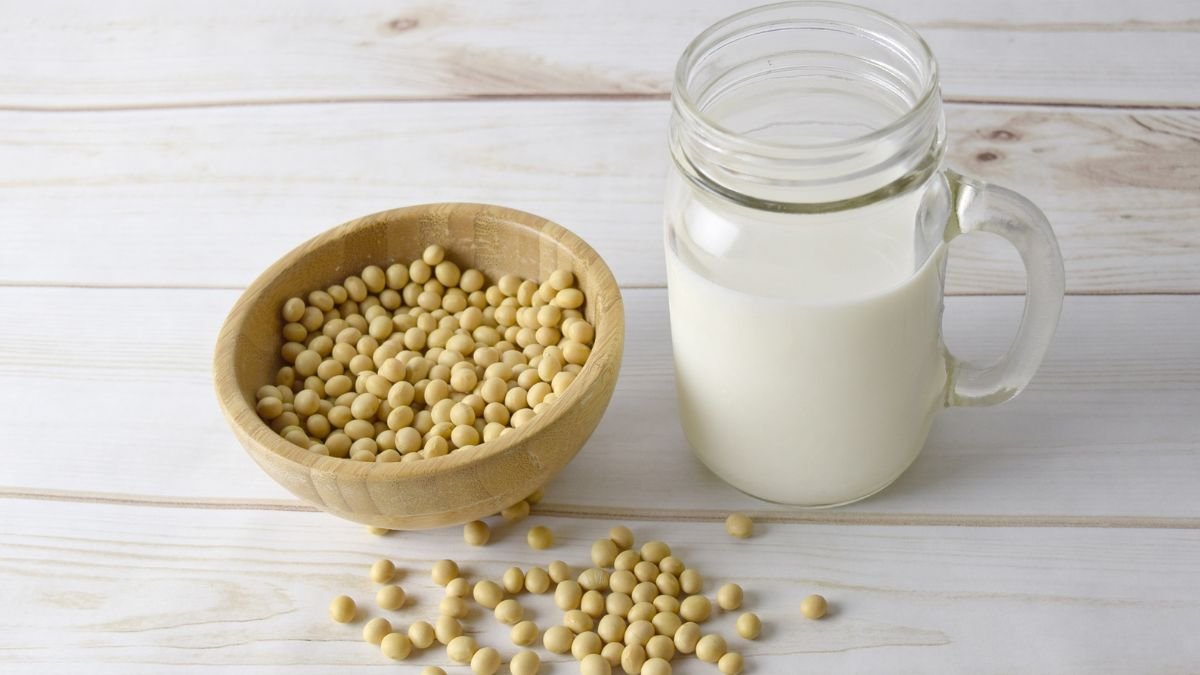Soy Milk: A Nutrient-Packed Plant-Based Milk

Soy milk is a plant-based milk alternative made from soybeans. It has become increasingly popular in recent years due to its versatility and numerous health benefits.
One of the main advantages of soy milk is that it is a great source of protein. One cup of soy milk contains 7 grams of protein, which is similar to the amount found in a glass of cow’s milk. However, soy milk is a complete protein, meaning it contains all nine essential amino acids, making it a great option for vegetarians and vegans who may not get enough protein from other sources.
Soy milk is also rich in nutrients such as iron, calcium, and vitamins B and D. It is also a good source of healthy fats, including omega-3 and omega-6 fatty acids. These nutrients are important for maintaining strong bones, healthy skin, and a healthy immune system.
In addition to its nutritional benefits, soy milk has several other advantages. It is low in calories, making it a great option for those looking to maintain a healthy weight. It is also cholesterol-free, making it a heart-healthy choice for those with high cholesterol or at risk for heart disease.
Soy milk is also highly versatile and can be used in a variety of dishes and recipes. It can be used as a substitute for cow’s milk in many recipes, including smoothies, baked goods, and even savory dishes like soups and sauces. It can also be used to make tofu and other soy-based products.
One of the main concerns about soy milk is that it is often genetically modified (GMO). However, there are many non-GMO and organic options available on the market. It is important to read labels and choose brands that use non-GMO soybeans or are certified organic.
Another concern about soy milk is that it contains phytoestrogens, which are plant compounds that mimic the hormone estrogen. Some studies have suggested that consuming high amounts of phytoestrogens may increase the risk of breast cancer and other health problems. However, these studies have been inconclusive and more research is needed. It is important to note that soy milk is generally considered safe to consume in moderation.
Overall, soy milk is a healthy and versatile plant-based milk alternative that can be enjoyed by everyone. It is a great source of protein and nutrients and can be used in a variety of dishes and recipes. While there are some concerns about its potential health effects, it is generally considered safe to consume in moderation. Whether you are a vegan, vegetarian, or just looking to try something new, soy milk is a delicious and nutritious choice.

Frequently Asked Questions (FAQs) About Soy Milk:
Is soy milk suitable for people with lactose intolerance?
Yes, soy milk is an excellent alternative for individuals who are lactose intolerant, as it is dairy-free and doesn’t contain lactose.
Can soy milk be used as a replacement for cow’s milk in cooking and baking?
Absolutely! Soy milk can be used as a substitute for cow’s milk in a wide variety of recipes, including smoothies, baked goods, soups, and sauces.
Is soy milk safe for those with nut allergies?
Yes, soy milk is typically nut-free, making it a safe option for individuals with nut allergies. However, it’s always essential to check product labels for potential cross-contamination.
Does soy milk contain gluten?
Pure soy milk is naturally gluten-free. However, it’s crucial to check labels, as some commercially produced soy milk products may have added ingredients that contain gluten.
How does the nutritional content of soy milk compare to cow’s milk?
While both soy milk and cow’s milk provide similar amounts of protein, soy milk is often considered a healthier option for those looking to reduce saturated fat and cholesterol intake. Soy milk is also suitable for individuals who follow a vegetarian or vegan diet.
Are there any concerns about the estrogen-like compounds in soy milk?
Some studies have raised concerns about phytoestrogens in soy, but current evidence is inconclusive. Moderation is key, and it’s advised to consult with a healthcare professional if you have specific health concerns.
Is all soy milk genetically modified (GMO)?
No, not all soy milk is genetically modified. Many brands offer non-GMO and organic options. It’s recommended to choose products that specify the use of non-GMO soybeans or are certified organic.
Can children consume soy milk?
Yes, soy milk can be a part of a child’s diet, but it’s essential to ensure they receive a balanced and varied intake of nutrients from different food sources.
Is soy milk environmentally friendly?
Soy milk is generally considered more environmentally friendly than dairy milk in terms of lower greenhouse gas emissions and land use. However, it’s essential to choose sustainably sourced soy products.
How can I incorporate soy milk into my diet if I’ve never tried it before?
Start by using soy milk in your coffee, cereal, or smoothies. Experiment with it in cooking and baking to discover the versatility it offers. Gradually incorporating it into your diet can help you develop a taste for it.
Also Read: All About Goat’s Milk | 10 Amazing Health Benefits
